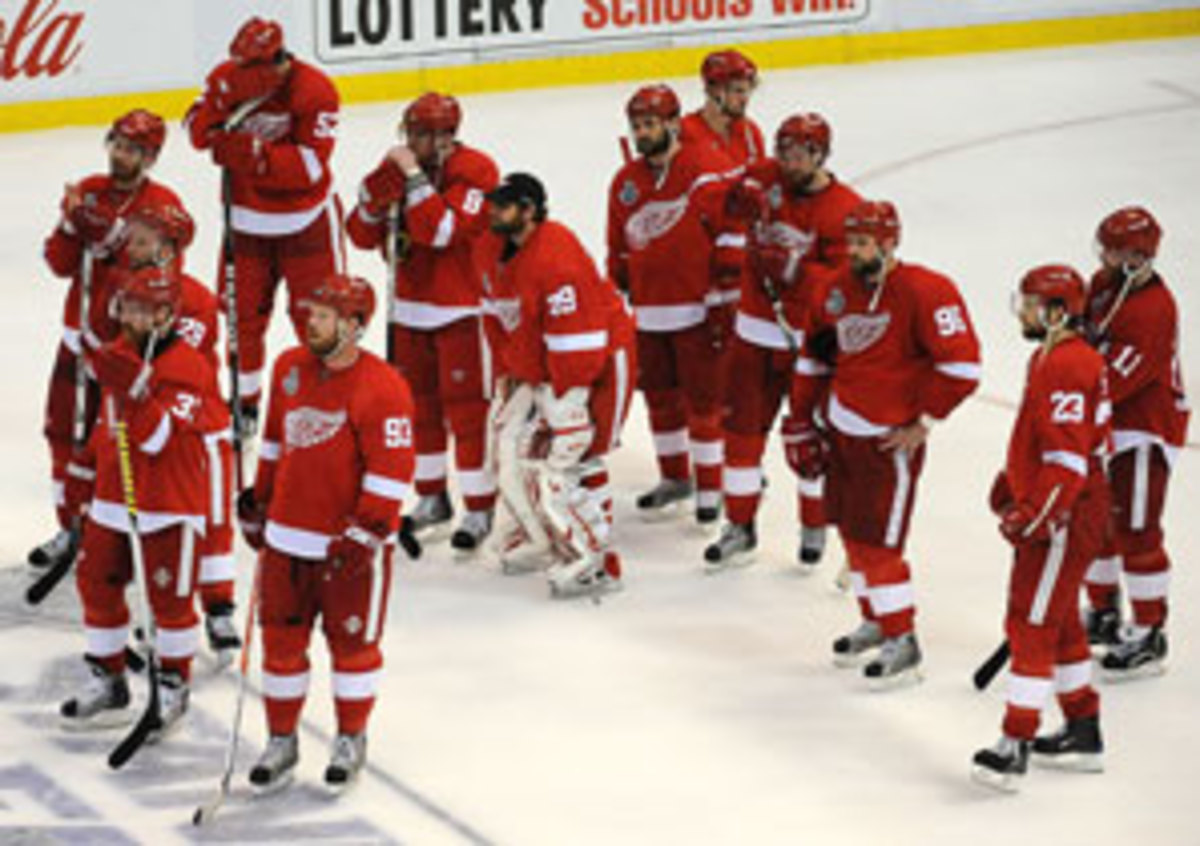Red Wings' loss adds to flood of bad news for Detroit
The stories in The Detroit News were just as grim: LEAVING MICHIGAN BEHIND: EIGHT YEAR POPULATION EXODUS STAGGERS STATE.
Bad news became so common during my stay that it no longer felt like news.
Last September, I moved to Ann Arbor after being awarded a journalism fellowship at the University of Michigan, a New Yorker-turned-temporary Michigander in the middle of the state's worst downturn in 25 years. Things went from bad to worse in a matter of months.
At the end of April, Michigan's unemployment rate was 12.9 percent, the worst in the nation and the highest in the state since November 1983. The News reported in April that a family leaves Michigan every 12 minutes; since 2001 the state has lost 465,000 people, roughly the equivalent of the combined populations of Grand Rapids, Sterling Heights and Warren -- three of the state's largest cities. Sociologists have a word for this: outmigration. The most common lawn sign around here, as Free Press columnist Mitch Albom wrote in SI (Jan. 12, 2009), is For Sale.
The downturn even permeated the sports culture. The Lions famously finished 0-16, arguably the worst single season of any professional franchise. Michigan football suffered the most losses (nine) in its 129-year history. The Pistons traded Chauncey Billups (for Allen Iverson!) and slumped to a first-round playoff exit, a meek end to an era of Detroit basketball defined by toughness.
The lone bright spot came when the Michigan State men's basketball team engaged in what The New York Times called "an emotional stimulus package." For one week in April, a state that is normally divided between the maize and blue of Michigan and the green and white of Michigan State rallied around Spartan Nation.
On the April night that Michigan State's magical run was ended by North Carolina, the Detroit Red Wings defeated the Sabres 4-1 in Buffalo. The win -- number 51 -- was the team's last of the regular season. The Wings entered the playoffs on a three-game losing streak. It was a strange season at The Joe. The team was oddly inconsistent, due in part to the struggles of 36-year-old goaltender Chris Osgood.
The playoffs arrived, and the Red Wings dusted off the Columbus Blue Jackets, barely breaking a sweat. Then came the Anaheim Ducks, who provided another punch to the state's gut, forcing Detroit to its first Game 7 since 2002. It was during that series that Red Wings coach Mike Babcock told GM Ken Holland that he felt the team was playing for all of Michigan.
"I know tons of families that have lost their jobs and are losing their homes," Babcock said. "My kids are all in sports, and there's two or three people on their teams losing jobs. And I'm not talking just your run-of-the-mill jobs. I'm talking guys that have worked for companies for 20 years, been engineers and don't have jobs and are losing their homes. We know families moving out of their homes, and that's going on all over Michigan, obviously." In Game 7, Detroit beat the Ducks 4-3 and never looked back. Until last night.
As an outsider, one can't help but admire the Red Wings' franchise, professional to the core. The players genuinely seem to understand the world outside the rink.
"I'd be lying if I said we didn't notice that at certain times there were a few more empty seats, not just this year but over the last couple of years," said left wing Kirk Maltby, who has been with Detroit since 1996. "But it doesn't seem to be any quieter or any less enthusiastic out there. It's understandable. Going to a sporting event, especially if you have a family, it's not cheap, and you can't hold it against them.
"I go to the mall or a restaurant or drop my daughter off at school, and people just want to say, 'Good luck,' 'Good job,' or this or that," he continues. "And you can tell they're still really passionate, not just about us, but about their sports. For last year's parade, so many people, regardless of tough times, they obviously skipped work to go. They love their sports teams here, and when you play well, they support you, and that's why I love it here."
A few days before the Red Wings lost to the Penguins, I spoke with one of the writers of the News piece on the migration of the state's best resources -- its people -- and asked him what he thought the impact a championship would have on the community.
"Winning a Stanley Cup isn't going to save one job," said Ron French, who penned the story with Mike Wilkinson. "It's not going to keep General Motors in business or fill the empty hotel rooms in Detroit. But it does give people something they haven't had in a long time, and probably won't again for a long time: a sense that, for one night at least, we're back where we used to be -- on top of the world."
That night won't come soon. I left Michigan in May, about the time the news was flooded with Chrysler's bankruptcy announcement and that the state's deficit had climbed to more than $1 billion. This week, GM announced it was closing 58 Michigan dealerships. The bad news keeps coming and the Free Press had it right on its web site tonight: HOCKEYFROWNS ALL AROUND.
SI media writer Richard Deitsch spent the 2008-09 -academic year as a Knight-Wallace Fellow at the University of Michigan. ±





